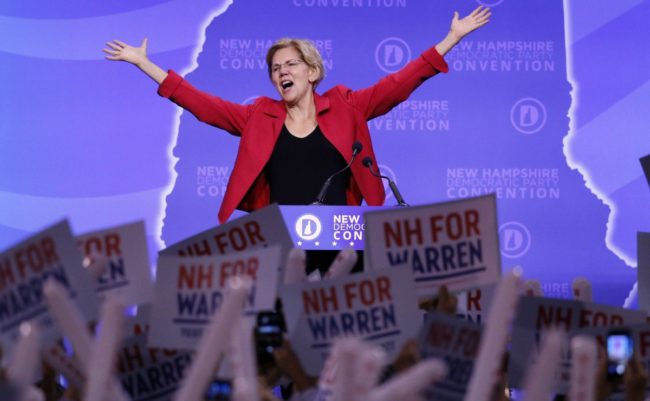
Elizabeth Warren’s Savvy Marketing Strategy
To be successful as a brand in a competitive market, you have to find a way to differentiate—and the Democratic field of hopefuls is no exception.
This presents a greater challenge than one might think, because it is not easy to find and then communicate a motivating differentiator. Elizabeth Warren seems to have found hers. Warren is surging in the polls and her momentum will likely continue because she has identified a perfect foil: giant, multinational corporations.
In her speeches and policy statements, she returns to the same theme again and again: the working people in the U.S. are struggling because giant, multinational corporations are taking advantage of the U.S. working class.
In last week’s debate, Warren invoked this idea whenever she could.
- “Our trade policy in American has been broken for decades and it has been broken because it works for giant, multinational corporations.”
- “Insurance companies last year sucked $23 billion in profit out of the system.”
- “This is how we build an America that reflects our values, not just where the money comes from with the billionaires and corporate executives.”
- “These are giant corporations that show, if they can save a nickel by moving a job to a foreign country, they’ll do it in a heartbeat.”
Donald Trump used this same comparison approach in his presidential campaign by attacking immigrants. According to Trump, working people in the U.S. struggle because the country is overrun by illegal immigrants. As president, he promised, he will build a wall.
A Savvy Move
Warren has a powerful platform. She is addressing the same concerns that Trump tapped into, but shifting the blame to a different place. The reason working people in the U.S. are struggling is the heartless corporate giants.
This works because people generally don’t like corporate giants. Pretty much everyone can rally around the idea. Who likes greedy, faceless multinational corporations? Who likes companies that abuse children? Companies that kill elephants and sloths and panda bears? Companies that steal our jobs and abuse our communities?
It is worth noting that Warren doesn’t identify companies by name. She doesn’t call out McDonalds, Coca Cola, Nike, or John Deere. This is smart; people like these companies. Who doesn’t like John Deere? The brand is built on farm, family and nostalgia. If Warren attacked John Deere, people would be more hesitant, “Wait, John Deere? What’s so bad about John Deere?”
The Power of Comparison
Perhaps the most effective way to differentiate is to directly compare to an alternative and highlight the points of difference. The interesting question, of course, is sorting out what to compare to. You want to compare yourself to something relevant and yet clearly inferior.
Apple, for example, ran a brilliant series of ads where it attacked Microsoft, at the time a widely disliked corporation. You can watch all 66 of them here. More recently, T-Mobile has relentlessly – and effectively – attacked Verizon. Wendy’s ran a Super Bowl ad highlighting the fact that, unlike Wendy’s, McDonalds uses frozen meat.
Creative marketers create foils. Kraft Singles, the processed cheese slices, at one point ran a very effective series of ads stating that while some singles are made with oil, Kraft Singles are always made with milk. Of course, only a few tiny brands use oil – all the big players use milk. Still, the campaign gave Kraft a big boost.
Warren is setting herself up as the great corporate slayer. If you like greedy corporations, vote for Trump. If you don’t, vote for Warren. It is a good platform and one that Warren owns more than any other candidate in the Democratic field.
With a compelling foil, Warren is set to continue to rise as a powerful candidate. Perhaps the election will come down to this question: who is worse, Trump’s illegal immigrants or Warren’s heartless, giant corporations?
Great analysis. I hadn’t pinpointed the corporate enemy as clearly as you have here. But it follows over her earlier role in the Clinton administration building protections for consumers.
Let’s hope the differentiation catches fire. Fingers crossed, fingers crossed. She still has much to do to penetrate very specific voting blocks. Hopefully she reads your blog Professor Calkins.